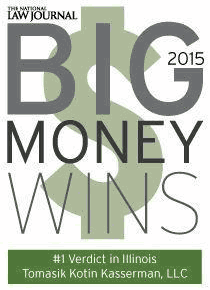Recent Blog Posts
America’s Biggest Tortfeasor? Leaked Memo Reveals Uber Unqualified to Handle 1000’s of Reports from Victims of Crashes, Assaults
 By: Tim Tomasik and Lindsay Proskey
By: Tim Tomasik and Lindsay Proskey
Uber investigators are overworked, underpaid, and in many cases have no experience qualifying them to examine thousands of serious reported incidents, according to an internal memo obtained by CNN. The 26-page memorandum revealed employees on Uber’s special investigation unit (“SIU”) routinely faced “serious level of stress and anxiety” related to massive caseloads handling the most severe incidents reported to the company, including verbal threats, physical and sexual assault, rape, theft, and serious traffic crashes. The internal document highlights the ride-share giant’s concerns about lost revenue from riders who learn about specific cases and hold a lasting impression that Uber is “unsafe” and “not worthy of their trust” after acknowledging CNN had actually underreported the incidence of sexual assaults.
Jet Slides Off O’Hare Runway, 129 Passengers Evacuated Amidst Winter Storm
 An inbound United Airlines flight with 129 people on board slid off a runway at O’Hare International Airport Saturday afternoon according to the Chicago Fire Department. Shortly after the plane came to rest, Chicago Firefighters assisted in getting the passengers deplaned from the aircraft which had taken off from Phoenix hours earlier.
An inbound United Airlines flight with 129 people on board slid off a runway at O’Hare International Airport Saturday afternoon according to the Chicago Fire Department. Shortly after the plane came to rest, Chicago Firefighters assisted in getting the passengers deplaned from the aircraft which had taken off from Phoenix hours earlier.
Although the Chicago Department of Aviation indicated other aircraft had landed safely on the runway just minutes before the attempted landing, snow had been falling for sometime after a winter storm descended upon Chicagoland Friday night and dumped five inches of snow on O’Hare by noon, according to the National Weather Service. At the time local media outlets reported the incident, Department officials indicated that it was in the process of working with United Airlines and City officials to recover the aircraft.
The past year has been chaotic for many passengers, including those who boarded an Aeromexico flight which crashed, injuring more than 80 people and sending dozens to the hospital. According to the BBC, there were twelve times as many plane crash fatalities in 2018 compared to 2017.
Kentucky Supreme Court Ruling Protects Malpractice Victims' Right to Trial
 By Lindsay Proskey
By Lindsay Proskey
Tort reform legislation requiring Kentuckians to submit medical malpractice claims to a review panel of three physicians before they can file lawsuits was recently struck down by the Kentucky Supreme Court for violating the state constitution.
Tort reform efforts aim to reduce the ability of victims to bring tort litigation or to reduce damages they can receive. Kentucky state Sen. Ralph Alvarado (a practicing physician and lawmaker) has sponsored several pieces of legislation, including the Medical Review Panel Act, to deter plaintiffs from suing healthcare professionals.
Proponents touted the Medical Review Panel Act as a step toward decreasing what they considered to be frivolous medical malpractice claims that have allegedly increased liability insurance and driven physicians from the “plaintiff-friendly” state. Before a plaintiff could even file a lawsuit, the Act required them to submit all medical malpractice claims to a panel of three healthcare professionals, who would review the merits and make non-binding recommendations to the court. However, the panelists could come from any field – a panel of three social workers could decide whether a surgeon was negligent, while three surgeons could review a case involving a social worker.
Lion Air’s Crashed Boeing 737 MAX Determined Unairworthy by Investigators
 By Tim Tomasik
By Tim Tomasik
Recurring technical issues and Indonesian carrier Lion Air’s failure to ground its Boeing 737 MAX led to pilots' battle for control over their jet as it plunged into the Java Sea on October 28, investigators said on Wednesday. Stopping short of saying what exactly caused the plane to crash, investigators cited multiple contributing factors centered on the plane’s anti-stall system, faulty sensors, and Lion Air’s inferior safety culture.
One day before the crash, pilots flying from Bali to Jakarta experienced similar issues and manually shut down the plane’s anti-stall system to adjust the plane’s pitch, regain control, and land safely. The flight crew immediately reported the occurrence to Lion Air maintenance, who deemed the plane airworthy for the next morning’s flight. Mechanics certified the Boeing but failed to check sensors that measured whether the nose of the plane pointed up or down.
Avoid All Romaine Lettuce, Warns CDC
By Lindsay Proskey
In its third warning since 2017, the Centers for Disease Control (CDC) told people not to eat romaine lettuce, which is linked to a multi-state E. coli outbreak. Along with the CDC, the U.S. Food and Drug Administration and Canadian officials are investigating the outbreak, which has sickened 50 people across the United States and Canada. No deaths have been reported, but 13 people in the U.S. and six in Canada have been hospitalized.
Unlike the previous warnings directed at specific brands or growing regions, this blanket warning is directed at any and all types of romaine lettuce, including salad mixes containing romaine. Officials believe that contaminated lettuce is still on the market and need more information about the outbreak’s source before suppliers can be asked for a recall, said FDA Commissioner Scott Gottlieb. In the meantime, retailers and restaurants should discontinue supplying romaine lettuce to the public, and everyone should throw away any romaine lettuce at home.
NTSB's Investigation Sheds Light on Southwest’s Boeing 737 Fatal Engine Failure
New facts emerged in Wednesday’s hearing about the fatal aviation accident on a Southwest flight in which one passenger was killed after engine debris shattered the window she was nearly sucked through. The National Transportation Safety Board (NTSB) released new testimony saying passengers rushed to pull Jennifer Riordan back into the airplane after seeing her head, torso, and arm hanging out of the broken window. Flight attendant Rachel Fernheimer recalled that Jennifer’s seat belt was still fastened as one passenger reached outside of the airplane and grabbed her shoulders to pull her body back in.
Pilots emergently landed the Boeing 737 in Philadelphia after learning that passengers were injured. Eight passengers suffered injuries, and Jennifer Riordan died tragically. This was the first death on a U.S. airline flight since 2009.
New Boeing 737 Crash Caused by Defective Sensor
Investigators determined that Boeing’s 737 Max jet, operated by Lion Air jetliner, experienced erroneous AOA readings causing pilots to battle the jet plunging at approximately 600 miles an hour into the Java Sea. The Federal Aviation Administration plans to order airlines to follow Boeing’s Operations Manual Bulletin (OMB), an advisory on how pilots should handle false readings from an AOA (Angle of Attack) sensor. Tragically, this catastrophe took the lives of 189 passengers and crew on October 29, 2018.
The AOA sensor determines whether the airplane, or its wings, are properly angled against oncoming wind in order to maintain lift and prevent the airplane from falling out of the sky. If the sensor malfunctions, however, the airplane’s control system erroneously reacts to an aerodynamic stall – as if the airplane were falling out of the sky – causing the plane to take corrective measures, such as abruptly diving.
Court Finds Uber’s Arbitration Clause Unenforceable
A court has rejected the $72 billion dollar rideshare giant’s most recent attempt to force its riders behind closed doors. In reversing the lower court, the First Circuit ruled that Uber’s mandatory arbitration clause was unenforceable.
In the suit, Uber recognized riders confronted with lengthy sets of terms and conditions rarely, if ever, review the fine print on their iPhones while signing up. Notably, Uber did not argue that any of the Plaintiffs actually saw the arbitration clause which waived their right to a jury trial or even clicked on the "Terms of Service & Privacy Policy" button. Rather, it relied solely on a claim that its presentation of the clause was sufficiently conspicuous to bind the Plaintiffs whether or not they chose to click through the relevant terms and arbitration clause.
Why does this ruling that Uber failed to properly communicate the terms of its arbitration provision matter for riders nationwide? Arbitration clauses prevent victims from going to court and discussing their cases publicly. Instead, riders and drivers are forced into what amounts to a privatized court system where the rules and practices favor businesses over consumers. There, judges and juries have been replaced by arbitrators who receive repeat business from companies like Uber and Lyft. Conversely, class actions provide a means for people to band together to pursue justice when companies engage in widespread violations of the law.
Generic Drug Companies Are Insulated from Liability When They Harm Patients
By Lindsay Proskey
Recently, the Seventh Circuit dismissed thousands of claims against Pfizer, the manufacturer of a generic testosterone drug, Depo-T, for inadequately warning consumers that Depo-T increased heart attacks in older men.[1] The consumers' right to relief hinged on Depo-T’s classification as a generic or brand name drug. The Seventh Circuit found the plaintiff’s claims preempted under federal law and barred by Supreme Court precedent, leaving these consumers without recourse. The controlling Supreme Court precedent and outdated FDA rules collectively frustrate state tort laws, impede on consumer rights, prevent injured consumers from judicial relief, and insulate generic drug companies from state product liability law under the guise of preemption.
Federal Preemption
Federal law “preempts” or displaces state law when state and federal law conflict. The doctrine of preemption derives from the Supremacy Clause[2] of the United States Constitution. Upon state ratification, federal law became superior over state law, within the realm of constitutionally delegated authority, thereby granting states the rights and powers “not delegated to the United States.”[3] Traditionally, states have the power to establish and enforce laws protecting the welfare, safety, and health of the public. Since federal and state governments have both exclusive and concurrent powers, a problem exists when both levels of government regulate the same subject matter. Where preemption applies, federal law trumps state legislatures, courts, administrative agencies, and constitutions. Thus, the Supreme Court accepts the Supremacy Clause as a “basic constitutional command that all conflicting state provisions be without effect.”[4]
The CDC Warns That Romaine Lettuce Infected With Shiga Toxin-Producing E. coli Can Be Fatal
By Lindsay Proskey
Recently, the Center for Disease Control and Prevention (“CDC”) warned that 149 individuals across 29 states have been infected with E. coli after consuming contaminated romaine lettuce. Of those infected, 64 people were hospitalized including 17 individuals who developed hemolytic uremic syndrome, a potentially life-threatening kidney failure caused by the abnormal destruction of red blood cells. Tragically, one death has been reported.
What You Need to Know About Shiga Toxin-Producing E. coli
E. coli are bacteria commonly found in the environment, foods, and intestines of people and animals. Although mostly harmless, E. coli can cause illness or death once escaped outside the intestinal tract. Symptoms such as abdominal cramping, bloody diarrhea, fever, or vomiting appear approximately two to eight days after consuming the bacteria. The most common mode of transmission to individuals is through consumption of contaminated foods, such as undercooked meat or through cross-contamination during food preparation. However, unhygienic person-to-person contact can also transmit the bacteria through the oral-fecal route.

 312-605-8800
312-605-8800
 By
By 



 312-605-8808
312-605-8808






